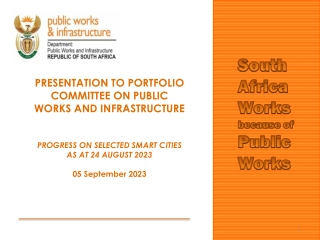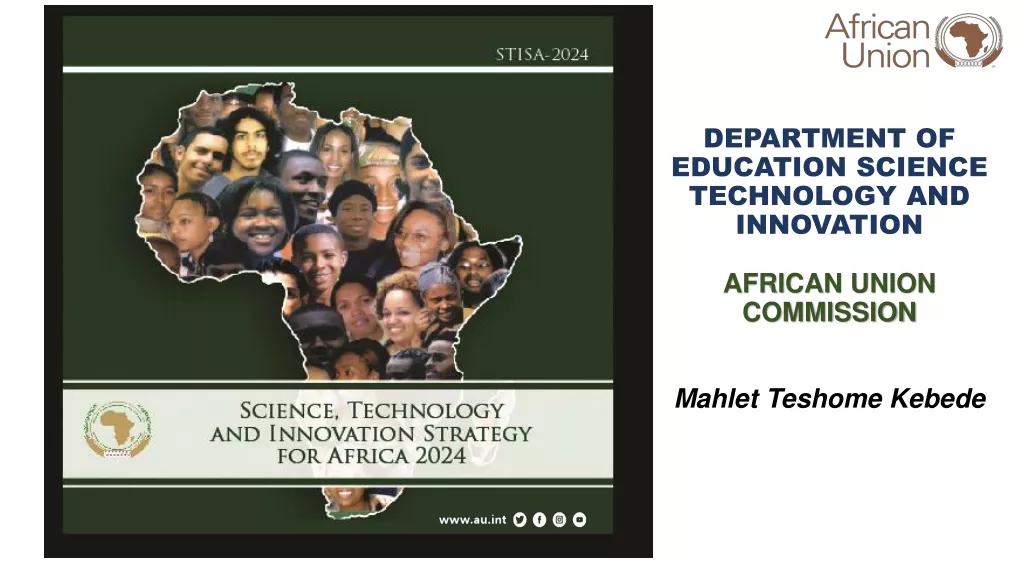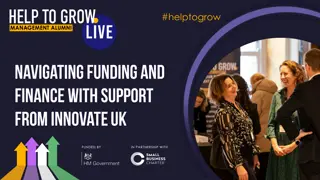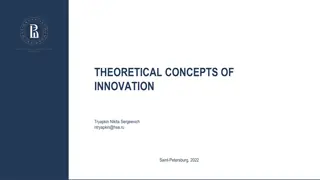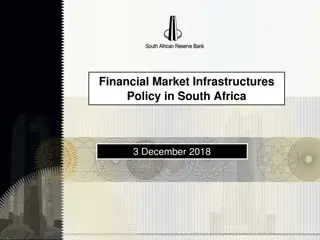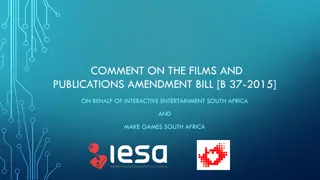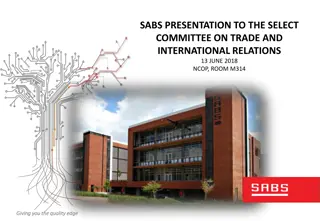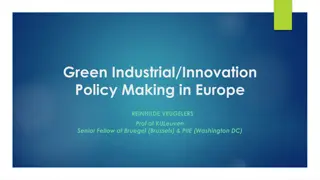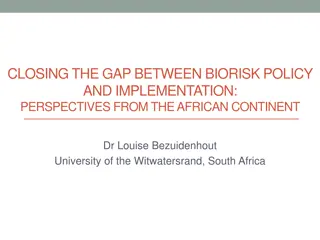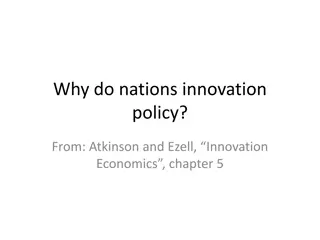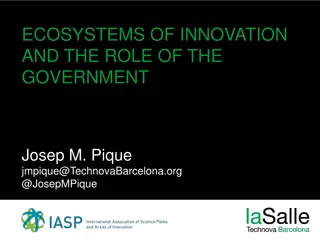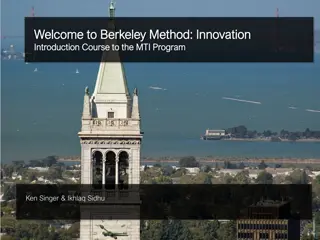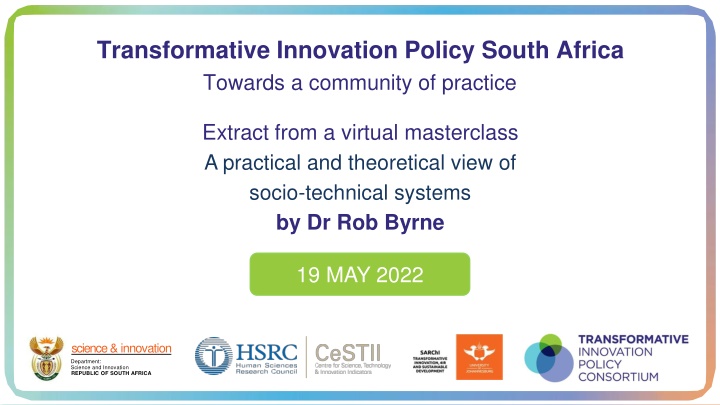
Transformative Innovation Policy in South Africa: A Practical and Theoretical View
Achieving the Sustainable Development Goals requires understanding complex interdependencies within socio-technical systems to guide societal development. Explore aspects of technology success, such as offshore wind generators, and the key components for transformative action.
Download Presentation

Please find below an Image/Link to download the presentation.
The content on the website is provided AS IS for your information and personal use only. It may not be sold, licensed, or shared on other websites without obtaining consent from the author. If you encounter any issues during the download, it is possible that the publisher has removed the file from their server.
You are allowed to download the files provided on this website for personal or commercial use, subject to the condition that they are used lawfully. All files are the property of their respective owners.
The content on the website is provided AS IS for your information and personal use only. It may not be sold, licensed, or shared on other websites without obtaining consent from the author.
E N D
Presentation Transcript
Transformative Innovation Policy South Africa Towards a community of practice Extract from a virtual masterclass A practical and theoretical view of socio-technical systems by Dr Rob Byrne 19 MAY 2022 science& innovation Department: Science and Innovation REPUBLIC OF SOUTH AFRICA
Introduction How can a socio-technical systems concept help us? Achieving the Sustainable Development Goals (SDGs) requires transformation of societies Societies function in complex ways that include social and technical interdependencies Understanding these complex interdependencies requires systemic analyses Technical change (e.g., technologies, technical knowledge, policy, etc.) Social change (e.g., cultural practices, politics and power, etc.) Ecological change (e.g., climate breakdown, biodiversity loss, etc.) Such understanding may help us guide societal development in desirable and transformative ways Socio-technical systems theory tries to achieve this understanding and provide guides for action
Aspects of technology success e.g., offshore wind generators Core technology Components Skilled workforce Supply chains Grid management Infrastructure Profitable Electricity practices Scientific knowledge Electricity demand Cultural meaning Energy markets Research & development Environmentally friendly Carbon markets Political support Social acceptability Conducive policies, laws, regulations Source: Adapted from Smith (2010, slide 4)
Aspects of technology success e.g., offshore wind generators User & market Profitable Technological Core technology Electricity demand Core technology Components Energy markets Supply chains Components Skilled workforce Carbon markets Infrastructure Supply chains Grid management Grid management Socio-cultural Infrastructure Profitable Skilled workforce Electricity practices Scientific knowledge Electricity demand Cultural meaning Cultural meaning Environmentally friendly Science Scientific knowledge Energy markets Research & development Environmentally friendly Social acceptability Research & development Carbon markets Political support Social acceptability Policy Conducive policies, laws, regulations Political support Conducive policies, laws, regulations Source: Adapted from Smith (2010, slide 4)
Stability of socio-technical systems Incumbent socio-technical systems tend to be stable due to a variety of path-dependencies Capabilities (e.g., widespread workforce skills, knowledge, experience) Economic structures (e.g., supply chains, interdependence across economic sectors) Vested interests, politics and power (e.g., sunk investments, profit streams, political influence) Compatible infrastructure (e.g., grid connection architecture for large land-based power stations) Institutions(e.g., policies on R&D subsidies, least-cost power sector development) Technological and user cultures (e.g., energy = carbon, electricity-dependent lifestyles) Social and technological, material and discursive processes reinforce one another Changes in one process are resisted by the others
Sources of instability of incumbent systems Incumbent systems are under pressure too, e.g. Environmental change (e.g., climate change) Social pressure (e.g., climate protests) Demography (e.g., mobilised youth support for climate action) Development ideologies (e.g., challenges to belief in market-based solutions to climate change) Internal dynamics and contradictions (e.g., confused responses to above pressures: climate science denial vs greenwashing ; rhetorical support of carbon capture but little investment) And major events such as natural disasters, wars, etc., can pressure incumbent systems Instabilities provide opportunities for alternatives Policies and programmes can be used to destabilise incumbents and/or promote alternatives
Some fundamental concepts Technology is not just a discrete artefact An artefact is highly visible but is embedded in a complex social, economic and technical system This system can be conceptualised as a technological regime (Hoogma et al 2002, p19) the whole complex of scientific knowledge, engineering practices, production process technologies, product characteristics, skills and procedures, established user needs, regulatory requirements, institutions and infrastructures
Some fundamental concepts Path dependency The options available now have been conditioned by past actions Co-evolution The interdependent changes of two or more processes Lock-in Unruh (2000, p818) argues that lock-in is a path-dependent, co-evolutionary process involving positive feedbacks among technological infrastructures and the organizations and institutions that create, diffuse and employ them
Socio-technical transitions (STT) theory Regime and transition concept Co-evolution, path dependency, lock-in Socio-cultural Science User & market Policy Technological Transitions are then defined as changes from one sociotechnical regime to another (Geels and Schot 2007, p399) Source: Adapted from Geels (2004, p912)
Transformative Innovation Policy South Africa Towards a community of practice Extract from a virtual masterclass A practical and theoretical view of socio-technical systems by Dr Rob Byrne 19 MAY 2022 science& innovation Department: Science and Innovation REPUBLIC OF SOUTH AFRICA

